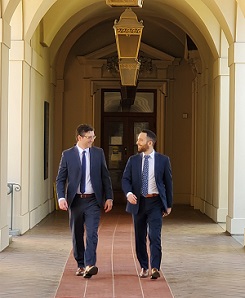

California Lemon Law
Our Services - A Cost-Effective and Aggressive Defense
The attorneys at Theta Law Firm, LLP defend manufacturers, distributors, and dealerships against Lemon Law and related claims. Our goal is to provide a cost-effective and aggressive defense that is consistent with our client's goals. To do so, we provide early evaluation of each case and attempt early resolutions whenever possible. When early resolution is not possible or is not advisable, we work closely with our clients to develop our litigation plan and defend the cases through trial, all while staying within the planned litigation budget. To learn more about our services in this practice area, contact Soheyl Tahsildoost.
What is California's Lemon Law?
Overview: The Song Beverly Act, also known as "California's Lemon Law," was designed by the legislature to protect consumers whose vehicle has suffered from substantial problems after multiple repair attempts by the manufacturer.
If the manufacturer is unable to repair the vehicle within a reasonable number of repair attempts or if the vehicle has been at the dealer for too long undergoing repairs, the consumer may be entitled to a full repurchase or replacement of the vehicle, as well as attorney's fees.
If a vehicle qualifies, the manufacturer will have to return to the consumer any down payment, monthly payments, registration and other official fees, other incidental expenses, reasonable attorney's fees and costs (meaning that the manufacturer pays for the consumer's attorney--not the consumer), and sometimes even an additional civil penalty (additional money damages).
This is only a broad overview of the applicable law, not a complete summary. The law does not only apply to vehicles; it applies to other consumer products as well. Note that the federal Magnuson-Moss Consumer Warranty Act also provides relief to consumers, but California's Lemon Law is generally what consumers in California sue under.
Sources: California Civil Code Section 1790 et seq.; 15 U.S.C. § 2301 et seq.
What Vehicle's Qualify for Buyback or Replacement under California's Lemon Law?
Consumers can get a buyback or replacement for breach of an express warranty or implied warranty under the Song Beverly Act.
Breach of Express Warranty under the Song Beverly Act: To establish a claim for breach of express warranty under California's Song Beverly Act, a consumer must prove the following (in addition to some foundational facts):
- The vehicle had a defect (or multiple defects) that substantially impaired it use, value, or safety to a reasonable person in the consumer's situation;
- The consumer delivered the vehicle to the manufacturer/distributor (the car company) or its authorized repair facility for repair of the defect(s) (or if the consumer is unable to reasonably deliver the vehicle for repair because of the defects, the consumer must provide written notice of the need for repair);
- The manufacturer/distributor (the car company) failed to repair the vehicle to match the written warranty after a reasonable number of opportunities to do so; and,
- The manufacturer/distributor (the car company) did not promptly replace or buy back the vehicle.
The consumer will also need to establish some more straightforward, foundational facts: (a) the consumer bought/leased a new motor vehicle from the manufacturer/distributer (the car company) or its dealership, and (b) the manufacturer/distributer (the car company) gave the consumer a written warranty.
Sources: California Civil Code Section 1793.2(d). See also: California Civil Jury Instructions (CACI) 3201.
Breach of Implied Warranty under the Song Beverly Act: New motor vehicles are sold with an implied warranty of merchantability that is separate and in addition to the written warranty. To establish a claim for breach of implied warranty of merchantability under California's Lemon Law, the consumer need only prove one of the following:
- The vehicle was not of the same quality as those generally acceptable in the trade; or
- The vehicle was not fit for the ordinary purposes for which such goods are used; or
- The vehicle was not adequately contained, packaged, and labeled; or
- The vehicle did not measure up to the promises or facts stated on the container or label.
